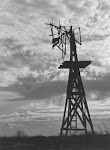The following description of our ancestor, Johnson Lyman Frost, is found in the "Biography and History of Audubon County, Iowa", H. F. Andrews, Editor... Indianapolis: B. F. Bowen & Company, 1915. I almost hate to reprint it here, but one seldom finds such a personal description of an ancestor... for good or bad. I do believe this section of the book, written in early 1900s, was written by an author who may have been of opposing political leanings. But I don't doubt that Frost was quite a character.
“J. Lyman Frost, with his son, Carlos, and Peoria I. Whitted [friend of Frost’s son-in-law D. Shafer], came from Iowa City to Audubon County in 1853. Frost was an old man, a widower, and lived alone in a shanty made of poles near his son, Carlos, in the Northwest part of section 35, Exira township. He was a contentious man and had a special faculty for stirring up the animals. He was an ardent Republican, a strong Union man, and had no use for anyone not strictly up to the highest pitch of party requirements, and he practically demonstrated his opinions on all possible occasions. He became postmaster at Hamlin’s Grove during war times. He was heartily despised by the Democrats and was not in unison with many of his own party. He was a discordant element at best. One of the patrons of his post office was one Martin Shults, whom Frost took occasion publicly to call a “copperhead”. Shults was a mild, inoffensive man, religiously inclined, and although the imputation was not wholly mis-applied from the standpoint of the times, the insult rankled in his bosom. Later, at a public gathering in Oakfield, Shults spied his quarry, removed his coat and handed it to his good old wife, “Aunt Julie”, remarking that he had a duty to perform, and then waded in and proceeded to “tan Frost’s dog skin.” That exercise performed, he proceeded to ride in haste to Exira in search of a justice to whom he might “plead guilty”. But he was pursued by the constable, John Crane, and arrested for assault and battery. It is said that Crane was so desirous of gaining popularity that he overrode and injured a fine horse in making the arrest. And it is also said that his promptness in the matter afterwards cost him an election to office.
Mr. Frost was easily a party leader locally. He held the ear of governor Kirkwood, with whom he was personally acquainted at Iowa City, and stood in with the administration in Washington. He made the weather and crop reports, etc. and received his contingent of government documents, seeds, etc. which he conscientiously distributed among the faithful. He was one of the first to raise an apple orchard and other tame fruit in the county. He was prompt and zealous in attending to party affairs and in managing the Republican party machinery in the county, being sometimes chairman of the county central committee. But after a disagreeable faction contest with the Ballards and others in a county convention at Green’s schoolhouse, in 1868, he soured on party work and never afterwards took an active part in politics.
In preparation for war, militias were organized in the county. "The names of one roll show that all the officers of Capt. Thomas’s company, except one, and fifty of the privates were Democrats, some of them emphatic anti-war men. It appears that the commissions of the officers were sent by the adjutant general to J. Lyman Frost, the then postmaster of Hamlin’s Grove, a rigid Republican, to act as mustering officer, and to deliver them to the company officers-elect upon taking the proper oaths of office; but that he declined to muster them or to deliver the commissions presumably because he knew many members of the company to be anti-war men, and of questionable loyalty or patriotism to the country.
Captain Thomas said that his commission was not delivered to him, but was found on the prairie, having evidently been thrown away. And he further says that arms were not issued to his men, as it was considered dangerous to do so, fearing that the men would fight among themselves, as the excitement was intense between the Union and anti-war men."
Johnson Lyman Frost and son Elias Carlos Frost were officers of another militia formed in the county... the Audubon Mounted Infantry. That company saw no service and became obsolete at the close of the war, the following year.
4 hours ago

No comments:
Post a Comment